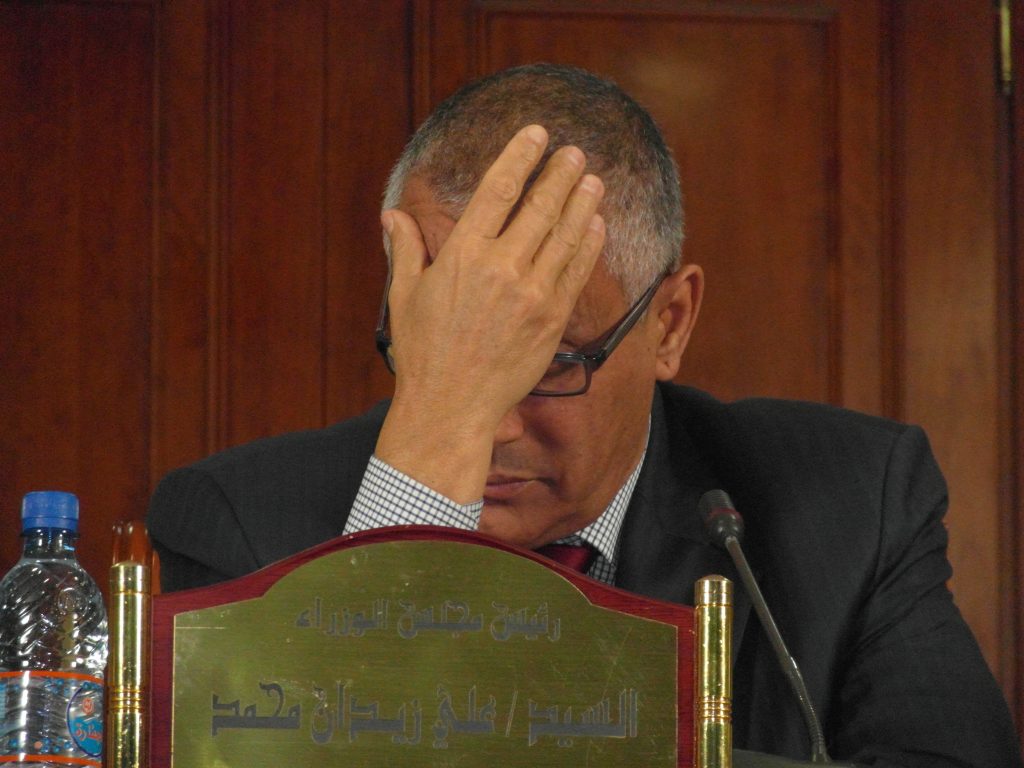By Libya Herald staff.

Tripoli, 11 March 2014:
Congress has passed a vote of no confidence in Prime Minister Ali Zeidan, voting at . . .[restrict]the same time in favour of the February Committee’s roadmap to hold elections to a new parliament in July. Congress has appointed Defence Minister Abdullah Al-Thinni as caretaker Prime Minister for a period of two weeks while a replacement is found.
However, questions have been raised in Congress and elsewhere over the legality of the vote.
Independent Benghazi Congressman Alaeddin Al-Mgariaf told the Libya Herald that Congress had passed the motion removing Zeidan with 124 votes in favour out of 138, a margin of just 14. It is said to be a vote purely against Zeidan as prime minister, not against the rest of the government.
Mgariaf also said that in the same vote Congress had approved the roadmap put forward by the February Committee replacing itself in elections to a new legislature. The one change to the committee’s proposals was that the appointment of a state president would be left up to the new legislature to decide whether those he would be elected by pubic election or appointed by itself.
Members of the Muslim Brotherhood and its allies are said to be opposed to direct elections, supposedly because they feared they could not win.
Mgariaf said that Congress had committed itself to handing over a new law to the Higher National Elections Commission within one month to enact parliamentary elections which he envisaged taking place in July.
“This is the best thing for Libyans,” he said. “This is a very good choice. We were getting to the point where the country is on the point of collapse”. Libya needed a new leader, he said, todeal with the crisis.
Congressional spokesman Omar Hemidan, confirmed that Defence Minister Abdullah Al-Thinni would remain in office for just two weeks while a replacement was sought.
Union for the Homeland Congressman Abdullah El-Kabier said while voting was taking place that Congress members had been “saddened” by Zeidan’s handling of the recent illegal oil shipment from blockaded eastern oil terminals and this was the principle reason the vote was possible.
Some Congress members dispute the legality of the vote sacking Zeidan. Speaking on the television channel Libya Al-Ahrar, National Forces Alliance Congresswoman for Sabratha and Zuara Asmaa Sarbia said it should have taken place in public. She insisted that the decision of no confidence in Zeidan and the roadmap should not have been considered in the same vote and that it was not the job of Congress to amend the roadmap.
The choice of Thinni as acting Prime Minister has also provoked comment. “This parliamentary vote is a coup by another name,” one western defence expert resident in Libya said, echoing comments made on social media networks following the announcement.
Thinni, however, has proved himself an effective conciliator. In December, he managed to mediate an end to fighting between Tebu and Zwai militias at the Sarir oilfield which resulted in water shortages from Sirte to Benghazi because power lines were brought down in the clashes and pumps on the Man-=Made River could not work.
In January, he mediated a solution to a blockade at the Sharara oilfield by Tuareg protestors demanding National ID cards and the removal of Obari’s unelected local council, with assurances that the government would address their demands. However, when nothing happened, the protestors last month renewed the blockade. Al-Thinni was back at the oilfield on 2 March to meet re-negotiate with the protestors which led to them deciding on Saturday to once more suspend their action pending a news government response to their demands.
Thinni’s son, Muhammed, was kidnapped in September and held for four months. He was released in January. Despite his family’s anguish, the minister continued with a full programme of official duties throughout the period. [/restrict]







